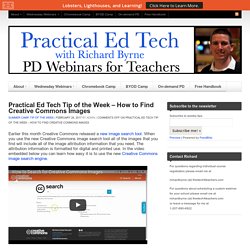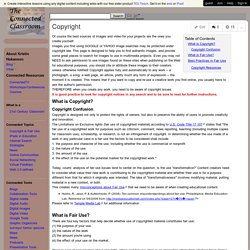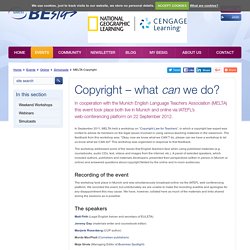

Resources for Educators. Copyright and Plagiarism. Copyright. Copyrights and Wrongs and Fair Use. COLLECTION: Copyright, Fair Use, and Plagiarism. COLLECTION: Creative Commons Resources. How to Find Creative Commons Images. Earlier this month Creative Commons released a new image search tool.

When you use the new Creative Commons image search tool all of the images that you find will include all of the image attribution information that you need. The attribution information is formatted for digital and printed use. In the video embedded below you can learn how easy it is to use the new Creative Commons image search engine. On a related note, PhotosforClass.com offers a great way to include a Creative Commons image search tool in your classroom, school, or library website. A demonstration of that tool is featured in the following video. Here are the week’s most popular posts from FreeTech4Teachers.com: 1. Join me this summer for the Practical Ed Tech Chromebook Camp or the Practical Ed Tech BYOD Camp.
About The Licenses. Our public copyright licenses incorporate a unique and innovative “three-layer” design. Each license begins as a traditional legal tool, in the kind of language and text formats that most lawyers know and love. We call this the Legal Code layer of each license. But since most creators, educators, and scientists are not in fact lawyers, we also make the licenses available in a format that normal people can read — the Commons Deed (also known as the “human readable” version of the license). The Commons Deed is a handy reference for licensors and licensees, summarizing and expressing some of the most important terms and conditions. Think of the Commons Deed as a user-friendly interface to the Legal Code beneath, although the Deed itself is not a license, and its contents are not part of the Legal Code itself.
Searching for open content is an important function enabled by our approach. Public Domain Collections: Free to Share & Reuse. That means everyone has the freedom to enjoy and reuse these materials in almost limitless ways. The Library now makes it possible to download such items in the highest resolution available directly from the Digital Collections website. Search Digital Collections No permission required. No restrictions on use. Below you'll find tools, projects, and explorations designed to inspire your own creations—go forth and reuse! Visualize the Public Domain An experiment by NYPL Labs to help patrons understand and explore what is contained in this release. Copyright.
Image Copyright. Plagiarism Game - Snowden Library. The Connected Classroom - Copyright. Of course the best sources of images and video for your projects are the ones you create yourself.

Images you find using GOOGLE or YAHOO image searches may be protected under copyright law. This page is designed to help you to find authentic images, and provide some great places to search for images to use in multimedia projects. Even you may not NEED to ask permission to use images found on these sites when publishing on the Web for educational purposes, you should cite or attribute these images to their creators unless otherwise notified! Copyright applies fully and automatically to any work -- a photograph, a song, a web page, an article, pretty much any form of expression -- the moment it is created. This means that if you want to copy and re-use a creative work you find online, you usually have to ask the author's permission. Copyright – what CAN we do? In September 2011, MELTA held a workshop on “Copyright Law for Teachers”, in which a copyright law expert was invited to advise its members on the legal issues involved in using various teaching materials in the classroom.

The feedback from this workshop was: “Okay, now we know what we CAN’T do, please can we have a workshop to let us know what we CAN do!” This workshop was organised in response to that feedback. The workshop addressed some of the issues that English teachers face when using published materials (e.g. coursebooks, audio CDs, text, videos and images from the internet, etc.). A panel of selected speakers, which included authors, publishers and materials developers, presented their perspectives (either in person in Munich or online) and answered questions about copyright fielded by the online and in-room audiences.
Recording of the event The workshop took place in Munich and was simultaneously broadcast online via the IATEFL web conferencing platform.